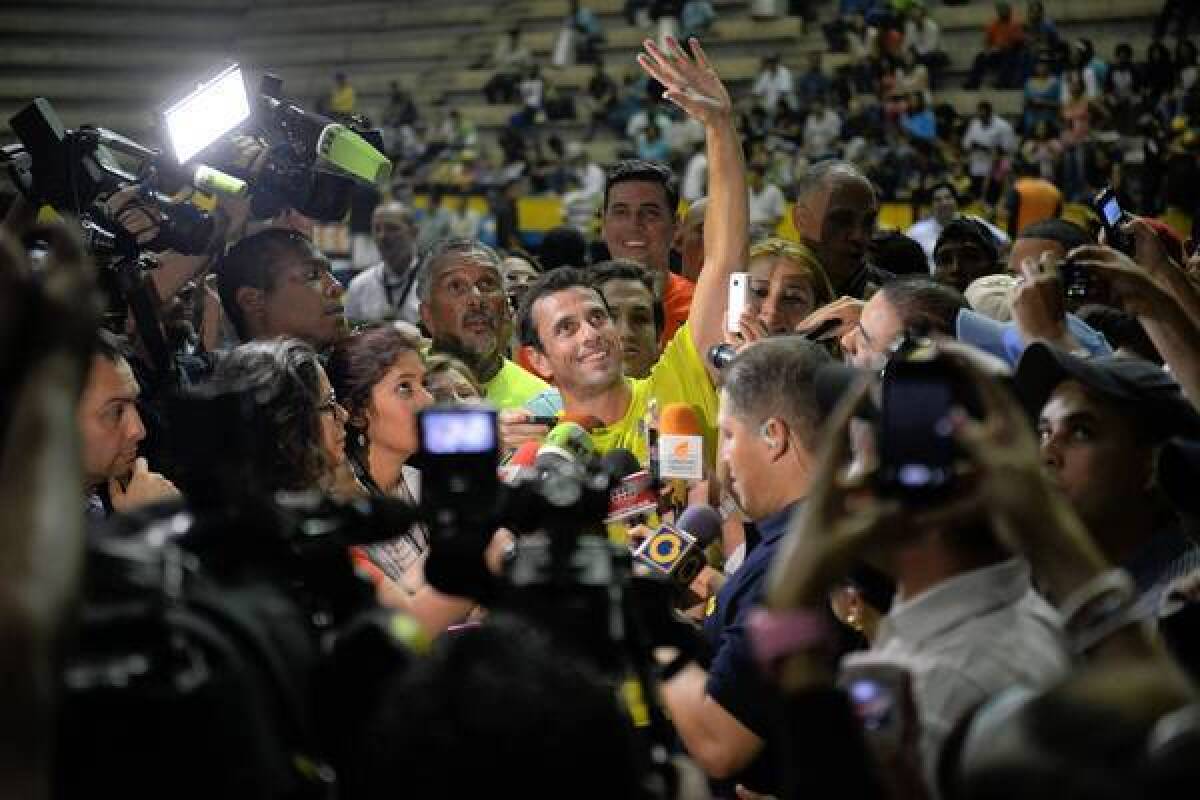Venezuela’s opposition candidate goes on the offensive

- Share via
CARACAS, Venezuela — When state Gov. Henrique Capriles ran unsuccessfully for president in October against longtime incumbent Hugo Chavez, he largely ignored a series of smears alleging that he was a Nazi or sexual pervert, saying he wouldn’t lower himself to responding to such insults.
But in the current campaign to fill out the six-year term of Chavez, who died of cancer last month, he is no longer a milquetoast. During the short but intense campaign, he has repeatedly labeled opponent Nicolas Maduro, who is Chavez’s political heir, a liar, incompetent and corrupt.
“No one dares tell you, but I will,” Capriles said of Maduro at a campaign rally before tens of thousands of supporters last weekend. “You’re a bum, chico.”
Interim President Maduro remains favored to win Sunday’s election largely on the strength of sympathy for Chavez, who named the former bus driver and union leader as his heir in December before departing for his final surgery in Cuba. Maduro has sworn to continue Chavez’s policies of redistributing billions in oil wealth into health, subsidized food and education programs for the poor.
But Capriles’ new strategy, which also includes slamming government inaction on rising inflation, soaring crime and food shortages, seemed to be resonating among voters in the run-up to the election.
The last opinion poll taken by Caracas-based Datanalisis on Thursday showed Maduro’s lead over Capriles, now the governor of Miranda state, had shrunk to seven percentage points from 15 at the end of March.
Another sampling by Datincorp had Maduro leading by only one percentage point as of Monday, down from a seven-point lead March 18.
“Without a doubt, Capriles’ change in strategy has made his supporters feel more optimistic and confident he will defend their vote. That wasn’t the case in October,” said pollster Jesus Seguias of Datincorp.
“I’m not the same as I was in October, when I tolerated many abuses,” Capriles acknowledged to supporters Wednesday in Cumana during one of his last campaign stops. In the same speech, he referred to Chavista energy minister Rafael Ramirez as a “blackmailer” and Venezuela’s richest man, implying that the minister was dishonest. The crowd roared in delight.
Capriles, said pollster Seguias, appears to be adapting to the fact that “Maduro is not Chavez” and does not command the reverence that the late leader was shown by many of his supporters. Capriles, 40, feels that he can attack Maduro, 50, an untested and largely unknown political commodity. “Polls show there isn’t much trust among Chavistas for Maduro,” Seguias said.
The new strategy has found admirers among people such as Ivan Freites, a 49-year-old employee of the state-owned oil company PDVSA, who attended a Capriles rally in Falcon state.
“It’s a 180-degree change. He was too deferential to Chavez before, but now he is going right to issues that hit at all social classes,” Freites said in an interview.
Capriles has also been helped by Maduro’s missteps and, at times, unorthodox behavior on the stump that have portrayed the interim leader as an inexperienced campaigner.
Maduro, who was named vice president late last year, has several times wept at the mention of Chavez’s name, which has struck some observers as staged. Last week, he claimed that Chavez’s spirit visited him in the form of a little bird. And he has threatened to cast an Indian curse over opposition voters.
Moreover, Maduro claimed in a San Cristobal speech April 3 that Capriles had brought in Colombian mercenaries to destabilize the country. He then raised eyebrows when he said: “The first thing we have to do is shoot [Capriles] legally, make him resign his office, and take him prisoner.”
Bruce Bagley, an international relations professor at the University of Miami, said that Maduro has proved to be not just a bad candidate but “a bizarre one,” referring to what he views as the candidate’s over-the-top efforts to hitch his political star to Chavez.
“His behavior has eroded some of that goodwill he inherited from Chavez, but so has the deterioration of the economy, the widespread discontent with increasing shortages of foodstuffs, and rising insecurity. It’s all playing into the hands of Capriles,” Bagley said.
Political science professor Luis Salamanca at the Central University of Venezuela said Capriles’ more aggressive focus has energized his base of support and given him a possible advantage in a key element in Sunday’s balloting: voter turnout.
“The miracle Capriles is hoping for is that Chavista voters won’t come out in droves,” said political scientist Javier Corrales, a professor at Amherst College. “But the polls have rarely said the election will be close, only that Maduro’s margin has shrunk.”
One veteran Latin America analyst, who spoke on the condition of anonymity because of his dealings with the Venezuelan government, said the power of the government “machine” to mobilize the vote plus Chavez’s blessing still make Maduro a formidable candidate.
“Even in death, Chavez has a stranglehold over this country,” said the analyst, who noted the poor showing of opposition candidates in December statehouse elections before predicting Maduro will win the vote by 5 to 10 percentage points.
Bagley said the Chavista control of the budget and bureaucracy and the ability of government employees to help get out the vote remain enormous advantages for Maduro.
“In the final analysis, it will be the Chavistas counting the votes,” Bagley said.
Kraul and Mogollon are special correspondents.
More to Read
Sign up for Essential California
The most important California stories and recommendations in your inbox every morning.
You may occasionally receive promotional content from the Los Angeles Times.










